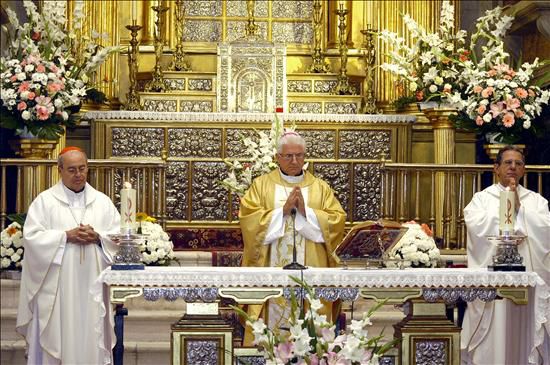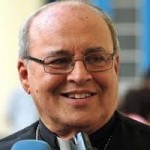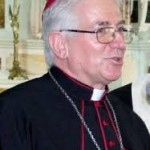
Archbishop Ortega and the Bishops Conference
HAVANA, 17 Nov 13 – The Archbishop of Havana, Cardinal Jaime Ortega Alamino, no longer has any formal duties on the board of the Conference of Catholic Bishops of Cuba (COCC), the Church’s highest organ of coordination and direction.

Ortega was vice president of the Conference, which he had headed on several occasions. The current president, Msgr. Dionisio García, Archbishop of Santiago de Cuba, was confirmed in his post. All other board members were confirmed; Ortega was the only departing prelate.
The bishop of Villa Clara province, Msgr. Arturo González, was elected to replace Ortega. González has been mentioned as a strong candidate to replace Ortega as head of the Havana archdiocese. Another likely substitute, according to fairly reliable sources, is Msgr. Emilio Aranguren, bishop of the eastern province of Holguín,

In 2011, cardinal Ortega, having reached the age of 75, submitted his bid for retirement to then-Pope Benedict XVI, but the pontiff granted him a postponement “sine die,” i.e., without a specific deadline.
Ortega absence from the COCC board is interpreted in differing ways by Havana Catholics. “Apparently, the postponement has ended,” said one man leaving Sunday Mass at the church of San Juan de Letrán. A woman leaving the Church of the Sacred Heart of Jesus, in the Reina district, speculated that Ortega’s fellow prelates “are hastening his retirement because of internal disagreements.”
At the Havana Cathedral, at least one faithful said that “it was time to replace him.” However, a majority agreed that “we’re going to miss him once he’s gone. He took the Church out of the temples, vindicated our rights and helped liberate the political prisoners. May God not allow his successor to pull us back into the old times.”
Those opinions, and others, reflect the assessment made by some parishioners of their spiritual leader, who has been controversial even to his own colleagues at the COCC. That attitude was clearly seen when they denied Ortega their support after the U.S. media magnified statements he made at Harvard University in April of last year.* Only two auxiliary bishops signed a note of support, whereas Cuba has 16 bishops, three of them retired.
Cardinal Ortega’s final destination could be Rome, where, according to serious opinions, he could take part in one of the key committees. He would be welcome, in view of the changes the Vatican curia is going through. Pope Francis, who upheld the postponement of Ortega’s retirement, sent him as his official representative to the Eucharistic Congress held in El Salvador last August.
But the important issue for Catholics and Cuba is not the cardinal’s departure. They wonder about the pastoral policy of the incoming archbishop, whoever he might be. Moreover, they worry if what has been happening inside the Catholic hierarchy on the island represents a reversal of the positions held by Ortega, i.e., respect for the State, dialogue, aperture, and reconciliation of all Cubans.
Many Catholics fear a return to the old stances of friction with the government and the loss of spaces earned through dialogue.
*[Translator’s Note: A report on Ortega’s Harvard appearance is in: http://www.thebostonpilot.com/article.asp?ID=14649 ]
Progreso Semanal/ Weekly authorizes the total or partial reproduction of the articles by our journalists, so long as source and author are identified.

